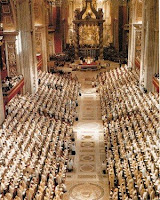Opening up the question of Vatican II?
 News is hotting up of the imminent release of a new document relating to Ecclesia Dei and the SSPX. Yesterday, the liberal French new service Golias had an article Vers un nouveau Motu Proprio pour les Lefebvristes (go over to Fr Z for a reader's rough translation.) The article suggests that the Pope is preparing a new document that will facilitate the re-integration of the SSPX in the Church. It is interesting to see the name of Fr Nicola Bux mentioned as one of the "bad guys" working tirelessly for a restoration of traditional Catholicism.
News is hotting up of the imminent release of a new document relating to Ecclesia Dei and the SSPX. Yesterday, the liberal French new service Golias had an article Vers un nouveau Motu Proprio pour les Lefebvristes (go over to Fr Z for a reader's rough translation.) The article suggests that the Pope is preparing a new document that will facilitate the re-integration of the SSPX in the Church. It is interesting to see the name of Fr Nicola Bux mentioned as one of the "bad guys" working tirelessly for a restoration of traditional Catholicism.Then there is a further piece on the subject: Robert Moynihan's "Newsflash" at the excellent "Inside the Vatican" magazine. (See: Where Is the Ecclesia Dei Document?)
According to Moynihan, a constitution for Ecclesia Dei has been ready for some time, was to have been published on 19 June, but has been delayed because of its controversial contents. His source says:
"The document regulating the role of Ecclesia Dei is all written. It has three parts: 1) some technical points concerning how it will function; 2) some measures about its relationship to the CDF, within the CDF; and 3) an outline of a program for discussing Vatican II and how the Council should be interpreted in keeping with the perennial tradition of the Church."The problem is, of course, with section 3. As Moynihan comments:
Benedict, knowing that the Second Vatican Council was a watershed in the history of the Church, and knowing also that the interpretation of the Council has led in some unexpected and erroneous directions, has decided to face the basic problem — the problem of the interpretation of Vatican II — by placing the Ecclesia Dei commission in the heart of the most important doctrinal office in the Church, in the CDF.If this is true, it is most encouraging for two reasons. First, the question of the interpretation of Vatican II in terms of genuine reform and continuity needs to be addressed more intensely and it would be difficult to think of a better forum to do so than in discussions between the SSPX and the CDF.
Secondly, if the whole question of Vatican II is to be thrown open, it is unlikely that there will be any back-tracking on the liberalisation of the older form of the Roman rite, and it is likely that any "clarification" of Summorum Pontificum will be just that: a clarification and not an obfuscation.
